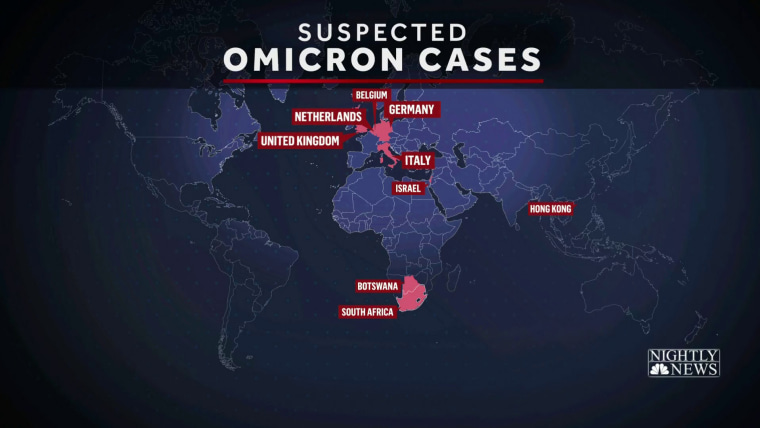Israel will on Sunday become the first country to ban the entry of all foreigners as the world races to understand and contain the new worrying variant of Covid-19 that emerged in southern Africa. The government also promised to use controversial phone-tracking technology to track and locate cases of the new omicron variant.
While no cases of the new variant have been detected in the United States, the nation’s leading infectious disease expert, Dr. Anthony Fauci, told NBC News that mutations displayed by omicron indicate that it may be highly transmissible and able to escape the body’s immune response, including the protection rendered by antibodies induced by the vaccines.
“You don’t want to frighten the American public but when something occurs that you need to take seriously, you take it seriously and you do whatever you can to mitigate against that,” Fauci said.
“If ever there was a reason for unvaccinated people to get vaccinated, and for those who have been vaccinated, when you time comes up, to go and get a booster shot,” he added.
The U.S. has restricted travel from South Africa and seven neighboring countries, effective Monday.
But experts, including Fauci, have told NBC News the variant could already be in the U.S.
“It’s already here,” NBC News’ medical contributor Dr Kavita Patel said. “We know from previous variants that by the time we pick it up in Africa and the European Union, it’s already likely.”
While there is still little understanding about omicron and how virulent it can be, a South African doctor who treated early cases of the variant told the BBC Sunday that countries could be “panicking unnecessarily” and the symptoms she had seen were “extremely mild.”
Dr Angelique Coetzee said she had first encountered the variant in patients who had fatigue, aches and pains, but no cough or change in sense of smell or taste, the BBC said. But she acknowledged that understanding of the variant was still developing.
Dr Angelique Coetzee, chair of the South African Medical Association, said she had first encountered the variant in patients who had fatigue, aches and pains, but no cough or change in sense of smell or taste. “We haven’t admitted anyone,” she said.
In Israel, which has confirmed one case of the variant and has seven suspected cases, officials announced they were barring foreign travelers from all countries and mandating quarantine for all Israelis arriving from abroad. The ban is expected to last for 14 days, Prime Minister Naftali Bennett said in a statement.
Bennett’s office also said that Shin Bet, Israel’s internal security agency, would activate cell phone monitoring in order to track and locate verified cases of the new variant.
The technology has been used on and off since the beginning of the pandemic, matching virus carriers’ locations against other mobile phones nearby to determine with whom they had come into contact. Earlier this year, Israel’s Supreme Court banned the government from sweeping use of mobile phone tracking of coronavirus carriers amid privacy concerns from civil rights groups.
Global measures to contain the new variant come as European countries reintroduce restrictions and curfews amid a surge in coronavirus cases.
Within days of the World Health Organization raising the alarm about the new variant, omicron cases were detected across Europe, including in the U.K., The Netherlands, Italy, Germany and Belgium, as well as in Australia, Israel and Hong Kong.
On Sunday, Dutch health officials identified 13 omicron cases among passengers who flew in on two flights from South Africa Friday after 61 tested positive for Covid-19.
The U.K., which suffered one of the worst outbreaks in Europe, has also identified two cases of the new variant. Prime Minister Boris Johnson announced Saturday anyone arriving in the U.K. would be asked to take a test on the second day and must self-isolate until they provide a negative test result. He also said face coverings will be made compulsory in shops and on public transport.
The speed and extent of travel bans imposed by numerous countries on South Africa and other countries in the region has prompted dismay in some quarters.
These measures are “akin to punishing South Africa for its advanced genomic sequencing and the ability to detect new variants quicker,” according to the South African Foreign Ministry.
“Excellent science should be applauded and not punished,” it added in a statement.
The WHO has also cautioned against hastily imposing travel restrictions, saying countries should take a “risk-based and scientific approach.”
As the world went on high alert over the weekend, Secretary of State Antony Blinken praised South African scientists for their “quick identification” of the new variant. In a statement Saturday, he also lauded the South African government for its “transparency in sharing this information,” which he said should serve as a model for the world.
Omicron was first reported in South Africa on Wednesday.






